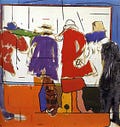The biggest obstacle to our capacity to love each other is that we fear the asymmetry of giving and not receiving. But the heart is a muscle: you can make it bigger by training it, and the bigger it gets the less it cares for symmetry or saving face. Instead of repetitions of lifting weights, you train your heart with repetitions of directing compassion at things, like that friend who's less available to see you than they used to be, or the crush who ghosted you after several nice dates.
I've been thinking about how someone saying no to you is your opportunity to show yourself who you really are. Because it strains your capacity, in the moment, to feel love. The moment when you hear sorry I'm booked the whole weekend once again when calling a friend about dinner plans. When you learn an old friend is in town and hasn’t reached out to see you. When you notice that your best friend is prioritizing their developing relationship to the detriment of your friendship.
A lot of the time we chalk things up to circumstance: I'm busy right now, you're busy right now, I'm about to move out or you're about to move out. And the majority of the time that's all it is. But sometimes, it really isn't circumstance. It's personal: maybe your date doesn’t find you as interesting or attractive as they'd like, or your friend is finding you increasingly tiring to be around compared to their other friends. Sometimes there's a status-driven calculus in someone's head that makes it easier for them to say no, or to forget to say anything altogether.
The trouble with wisdom is that it's easy to forget. In my more sober moments I'm fully aware that we're all manifestations of the same thing, that however many followers or expensive things or famous friends you have, you are nothing more than a frail primate in a decaying body. I know that climbing any of these ladders brings a fleeting and unsatisfying happiness. But in the moment that someone says no, in the moment that someone I admire fails to show up when they had promised to, the world morphs back into something I know it isn't: this individuated, transactional competition. This zero-sum game that promises that if I just got a bit further ahead I’d be content and never feel bad about myself again.
Having a bigger heart is about being constantly in touch with the inherent worth of every being. A good friend of mine is a vegetarian who takes care of a disabled pigeon. This doesn't quite capture it, because when you hear "a vegetarian who takes care of a disabled pigeon" you might imagine someone who embodies a tense attachment to high-brow moral principles, and that is not my friend: he's warmer and softer than that. His love enwraps the people and beings he comes into contact with. His tendency to care is primal, pre-conceptual.
My heart is not as big as his: I spend my dinner with him preoccupied with why I don’t get as much attention on Twitter as person-I’m-currently-envious-of. I’m so often oblivious to the suffering around me, fixated instead on whether I should text this old friend-person-crush-thing who hasn’t called me as much lately.
But I’m trying to love more. When I get caught up in my head, my prophylactic is to find a small way I can serve others. Call a friend who’s been struggling lately, greet strangers with a warmer smile, get food for someone in need. I wrote before about coming to terms with rejection by breaking spirals of negative self-talk. The next step is to have as much compassion for the person who’s saying no as I would for someone who says yes.
It’s after they’ve said no—once they’ve broken up with you, ghosted you, ended the conversation—that’s when they’re no longer evaluating you, that’s when you can stop caring what they’ll think of you. And that is the moment to show them love—not in order to change how they look at you, but to change how you look at yourself. You’re doing this for yourself, you’re doing it for the world you inhabit.
I have many wishes of the people that pass through my life. I wish you liked me back. I wish you texted when you came back to the city. I wish you called me out of the blue. But there’s one wish that matters more than all of them: I wish for you to be happy.
Thanks to James for feedback on earlier drafts of this piece.



This content is so important and this piece is so well written! Thank you for writing and sharing this Kasra!
My favourite bits:
1. The trouble with wisdom is that it's easy to forget.
2. Not in order to change how they look at you, but to change how you look at yourself.
I also feel like it's tough to feel appreciated when it feels like you're putting in a lot of appreciation, and I feel like you do a lot of that -- at least from what I've seen on your ig stories. Friendship is about both maintenance as well as managing expectations, so I try to "time" my expectations by not having them for the most part -- which is different from enforcing boundaries. One of my girlfriends and I text a lot, and if one takes a long time to respond even tho we were rapidly responding to each other just recently, then they apologize for it like "sorry I was out and about" to reassure the other without needing to be asked. I also don't have expectations about my birthday because they might be busy when I'm expecting a call or happy birthday, but once that comes then it feels so special.